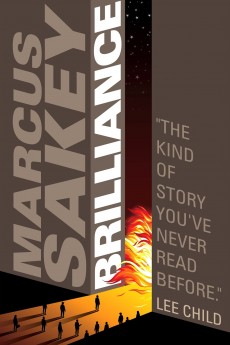In the ongoing saga of my bid to develop a healthy reading habit, I moved straight from The Girl With All The Gifts to Brilliance, a sort of science-fictiony, crimey-wimey novel by Marcus Sakey.
Cutting to the chase: I enjoyed Brilliance, but I didn’t love it. When I was much, much younger and occasionally attempted books that were a little above my station I came away with a sense of ‘muddiness’. What this meant was that, for one reason or another, I was unable to get a clear picture of the book’s narrative: some moments would jump out, the rest would just get lost in the murk. At the time, I attributed this to simply being not having enough experience to properly envisage the picture that the author was painting.
This may well still be the case, especially given how little I’ve practiced my reading skills over the last few years. However, I came away from Brilliance with a similar sense. In this case, it was less about muddiness and more an impression of things not quite being defined around the edges – a bit like playing a videogame with low render settings, leaving the background cloudy and imprecise.
This is, of course, an entirely subjective experience. Sakey puts a lot of work into creating his characters and developing a world that’s chillingly close to ours: he delivers a lot of imagery that remains very clear in my mind’s eye. Nevertheless, I still came away with that impression of blank space lurking just over the narrative’s horizon.
Another minor issue I had with the story was the tone. I couldn’t quite put my finger on it: the story was certainly good enough to keep me reading, but I wasn’t a big fan of the way it was written. As I continued to read I tried to pin this issue down, but couldn’t: there was no specific fault with the writing, it just jarred a little bit with me.
After I finished the book I did some research on Sakey (checked him out on Wikipedia, visited his website – the usual routine) and discovered that he’s more typically a crime writer. That helped it all click into place: his short, punchy style would be perfectly suited to crime fiction, but (for me) didn’t seem to adapt so well to the world-building scope of a science-fiction novel.
What did I learn?
At around the same time as reading Brilliance, I was able to get one of my own stories beta-read (thanks Kat!). One of the comments I received was that one or two scenes left my reader with a sense of the characters speaking against a white wall. It meant I simply hadn’t painted that particular scene well enough; I’d focused on a few key elements, but had kept the complete picture obscured.
While I favour a minimalist approach to my own writing (I like to give the reader space to paint their own picture) both the comment and my experience of reading Brilliance made me realise that there’s a danger of leaving too much blank space in your stories. While, as a writer, I may not feel that specific details are useful, the reader may well need them because they’re not in a position to look inside your head to fill in the blanks you’ve left on the page. I expect this is especially important when world-building: you don’t want to give your reader only half the information they need in order to see your world (while, simultaneously, making sure that your beautifully crafted world doesn’t get in the way of your compelling story).
I also learned that writing styles don’t necessarily map well across different genres. While my writing skews heavily towards horror, I have also dabbled in science fiction, dystopia and even noir-style fiction. Making sure that the tone matches the story is something I’ll be very much aware of in future.
Would I recommend it?
Yes, absolutely. Any book that can keep me reading through to the end is likely to be a worthwhile read for someone else. My issues above are entirely subjective and are best taken with a pinch of salt.
Meanwhile, if you’ve read Brilliance I’d love to hear your thoughts on it in the comments below …
